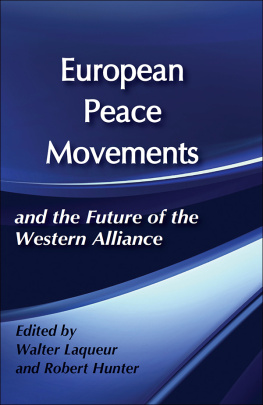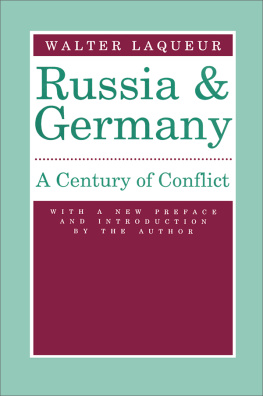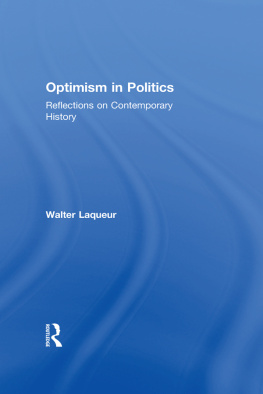First published 1980 by Transaction Publishers
Published 2017 by Routledge
2 Park Square, Milton Park, Abingdon, Oxon OX14 4RN
711 Third Avenue, New York, NY 10017, USA
Routledge is an imprint of the Taylor & Francis Group, an informa business
Copyright 1980 Taylor & Francis.
All rights reserved. No part of this book may be reprinted or reproduced or utilised in any form or by any electronic, mechanical, or other means, now known or hereafter invented, including photocopying and recording, or in any information storage or retrieval system, without permission in writing from the publishers.
Notice:
Product or corporate names may be trademarks or registered trademarks, and are used only for identification and explanation without intent to infringe.
Library of Congress Catalog Number: 79-64854
Library of Congress Cataloging in Publication Data
Laqueur, Walter Zeev, 1921
The political psychology of appeasement.
I. World politics1945 Collected works.
1. Title.
D.843.L.284 327.09045
ISBN 0-87855-336-3 79-64854
ISBN 13: 978-1-4128-6278-3 (pbk)
ISBN 13: 978-0-87855-336-5 (hbk)
Preface to the Paperback
Edition
The essays in this volume date back to the 1970s; written almost fifty years ago in the time of presidents Nixon and Carter and of Brezhnev; of what possible interest could they be in the world that has arisen since and is seemingly so different in almost every respect? To my surprise rereading them they seem to be of as much relevance now as they were then, perhaps even more so. This for two different and quite unrelated reasons. Partly because the main issues have little changedtake appeasement for instance or peace in the Middle East as elusive as ever. The main article in one of this mornings newspapers is entitled America is growing impatient with Europes appeasement. These were also the headlines of the 1970s. Some may argue that the writers of these articles are quite wrong, or at least exaggerate-there is no appeasement and America is not getting impatient. But such debates about the rights and wrongs are irrelevant, all that matters in the present context is the undisputed fact that the issues discussed are so similar or even identical.
But there is yet another aspect: To what extent do these discussions of bygone days teach us anything about the art (for it is hardly a science) of political assessment and prediction. Was it possible to get ones assessment right at the time? If not, what were the main pitfalls facing the analyst of the international scene? What lessons, if any, are to be drawn from the mistakes (or successes) of bygone days?
Finlandization was one of the key issues at the time. It referred to Finnish policy vis--vis relations with the Soviet Union, specifically to concessions that had been made by the Helsinki government in its foreign policy and to a lesser extent in its domestic affairs. According to the advocates of this strategy, it was inescapable in order to avoid the fate of the Baltic countries that had been occupied by Soviet forces during World War II and became part of the Soviet Union. According to the critics of Finlandization, these concessions went too far and were, at least in part, unnecessary. They limited to a serious extent the independence and sovereignty of Finland.
Furthermore, there was the concern that the Finnish model would spread and be emulated without need by other European countries following Soviet pressure, or the belief that unless Finnish policy would adjust itself to Soviet (Russian) interests, it would annoy the powerful neighbor. That would cause tension and conflict and perhaps even lead to military action on Russias part.
I came under attack for having introduced the term Finlandization into the political discourse of the age. But I had not invented it, as some maintained, this had been done by a friend, the late Richard Loewenthal, at the time of the building of the Berlin Wall a decade earlier. Nor had I ever argued that a small country, such as Finland, could afford to ignore the interests of a powerful neighbor. I was aware that the Finnish political leadership, including Kekkonen were motivated by patriotism. But it seemed also that the Kekkonen policy had gone too far and, that in any case, a measure of caution and self-censorship necessary in the case of Finland was not needed in other parts of Europe.
This was the time when Vice President Walter Mondale, George Kennan, and others praised the Finnish leaders for their farsightedness and courage and denounced those who had detected some negative elements in neutralism Finnish style. Some even argued that Kekkonen had set an example to be followed by others in Europe. As I saw it, Finlandization had been dictated by dire necessity. I failed to see moral integrity that could serve as an example for others. Various small nations resisted the encroachment of more powerful countries: The Albanians, for instance, went considerably further in resisting Soviet (and Yugoslav) pressure, but few, if any, were praising at the time Albanian moral superiority.
Today we know much more about the theory and practice of Finlandization owing to, among others, the resident of the KGB in Helsinki who published certain documents after the downfall of the Soviet Union. (V. Chernous and Hannu Rautkallio, The CPSU and Finland, Secret Documents, 19551968.)
Kekkonen, to be sure had been a patriot and very popular, but it was also true that considerable sums of money had been provided by Moscow to support him and his party. It could still be argued that this did not make him a Soviet agent, and that self-censorship, including, for instance, not publishing Solzhenitsyn had been inevitable in the circumstances. But the fulsome praise showered on him by some Western politicians and commentators had not been a morally superior course of action.
Today Finlandization has again entered the public discourse in connection with the situation in Eastern Europe, particularly the fears of the Baltic countries with regard to Russian designs in these parts. But the term is also used in connection with Chinas policy toward some of its neighbors, and it has even been mentioned concerning Israel and the West Bank. There always will be problems and dangers in the relations between big and powerful countries and their small and much weaker neighbors. Some (by no means all) of the behavior of countries such as Sweden and Switzerland toward Nazi Germany during World War II could be excused in this light. On the other hand, it is doubtful whether it was absolutely necessary for Eamon de Valera, president of the Republic of Ireland, to walk to the German embassy in Dublin after Hitlers suicide in late April of 1945 to express his condolence.
One of the essays in this volume, written in 1973, is entitled The Fall of Europe. It notes the fact that while Europes post-war economic recovery had been spectacular, it had not become a political giant. Forty-five years later the situation is not essentially different. True, a common currency has been introduced and some other steps have followed, but at the same time there is talk about certain countries leaving the European community.
If the majority of the British were against joining Europe, the situation today is not radically different, and within the United Kingdom separatism has become much stronger. These trends would perhaps not greatly matter if the world situation were more peaceful, if there were no threats to Europe and its various components. In 2015 there was talk among the members of the Arab League about the possibility of a common military force, even if very modest in size and with no certainty that such talk would ever become a reality.











